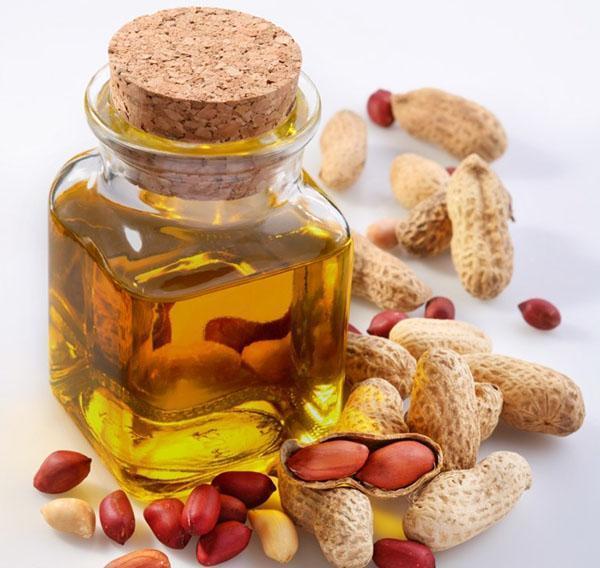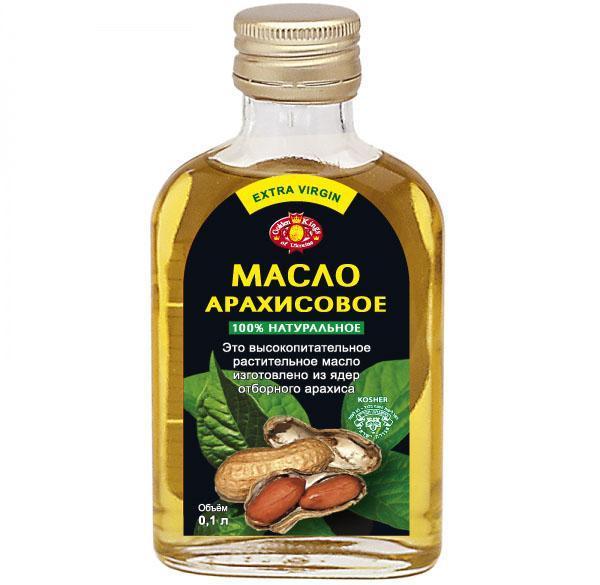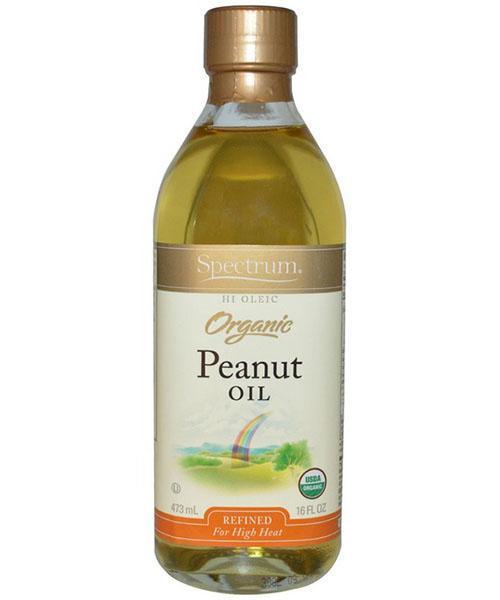Peanut butter is a useful product for health, taste and beauty
 Peanuts, or, as it is also called, "peanut", comes from Peru, here for the first time during archaeological excavations its fruits were found. In 1890, a nutritionist from America was the first to produce and use peanut butter, who was working on finding a dietary plant-based food product that could compete with cheese, chicken eggs and meat in its nutritional and energy properties. Peanut butter fully adopts the bright pronounced taste and smell of this nut. And the rich composition and thick enveloping consistency makes it suitable for use in a wide variety of areas - cooking, pharmaceuticals and cosmetology.
Peanuts, or, as it is also called, "peanut", comes from Peru, here for the first time during archaeological excavations its fruits were found. In 1890, a nutritionist from America was the first to produce and use peanut butter, who was working on finding a dietary plant-based food product that could compete with cheese, chicken eggs and meat in its nutritional and energy properties. Peanut butter fully adopts the bright pronounced taste and smell of this nut. And the rich composition and thick enveloping consistency makes it suitable for use in a wide variety of areas - cooking, pharmaceuticals and cosmetology.
Peanut butter, what is it like?
Peanut oil is a valuable dietary plant product, comparable in nutritional and biological value to animal products. Peanut butter production is based on 3 methods:
- Unrefined oil. It is a product of brown shades with a rich and bright nutty aroma and taste. Its production and application is established in Asian countries.

- Refined oil. This product has a softer, enveloping nutty taste and smell, and its color varies from light to dark yellow. This oil is produced and used in Europe and America.

- Cold pressed oil. In terms of its benefits and purity, this oil is the most valuable, it is used in medicine.

Contrary to all beliefs, peanuts are not nuts, they are legumes that, like all legumes, grow on earth!
Composition and calorie content of peanut butter
 The rich composition of peanut butter explains its distinctive properties and characteristics:
The rich composition of peanut butter explains its distinctive properties and characteristics:
- Amino acids. Oleic acid Omega-9 is about 60% of the oil from peanuts, and polyunsaturated linoleic acid Omega-6 is about 30%. Another 10% are saturated fatty acids - palmitic, alpha-linoleic, stearic, lignoceric, arachinic and others. All these are vital and irreplaceable components for human health.
- Digestible fats. Compared to animal fats, vegetable fats are easier and faster absorbed in the human body.
- Complex of vitamins of group B. Among them: B1, B2, B3, B5, B8 and B9. The role of these vitamins is assigned to the regulation of water-salt balance, as well as carbohydrate, fat and protein metabolism in the body. B vitamins have a positive effect on hormones, immunity and a person's appearance.
- Vitamin D. This fat-soluble vitamin helps the growth and regeneration of the skeletal system, it is necessary for the prevention of heart, cancer and endocrine diseases.
- Macro and microelements. These elements include magnesium, calcium, potassium, iodine, copper, phosphorus, iron, zinc, cobalt and others. All these components have a beneficial effect on human health, well-being and performance.
- Choline or vitamin B4. The well-coordinated work of the nervous system is impossible without this valuable vitamin; it also participates in the synthesis of phospholipids, which is important for preventing fatty liver infiltration and the development of gallstone disease.
- Betaine.Effective liver function is impossible without betaine; it also contributes to the complete assimilation of protein from food.
- Antioxidants This group includes vitamins A and E contained in peanuts and peanut oil. In modern life, an important role is played by antioxidants, which protect and restore the human body.
Scientists from Germany have proven that peanut butter contains the polyphenol resveratrol, which plays an active role in the prevention of excess weight and helps in the fight against obesity.
This substance has proven to be effective in normalizing the estrogen balance, has antitumor and antioxidant activity, lowers blood cholesterol concentration and improves liver function. Thanks to resveratrol, the production of collagen is activated in the human body, which has a positive effect on the condition of the skin, hair and nails!
The calorie content of peanut butter is about 600 kcal per 100 grams. This is a fairly high figure, like any other fatty oil product. However, these calories should not be regarded as habitual kilocalories, their effect on the human body is completely different.
Useful and medicinal properties
 The unique composition of peanut butter provides a wide range of applications in official and traditional medicine. Find out all about the benefits and dangers of peanut butter!
The unique composition of peanut butter provides a wide range of applications in official and traditional medicine. Find out all about the benefits and dangers of peanut butter!
Peanut oil - beneficial properties:
- The gallbladder. Peanut butter stimulates the function of bile formation and bile secretion, therefore it is an effective choleretic medicine.
- Liver. The oil is able to restore liver cells and prevent organ obesity.
- Digestive system. Peanut oil prevents inflammatory processes in any part of the gastrointestinal tract, has a disinfecting and wound-healing effect on the internal organs. Thanks to this, it copes well with gastritis and ulcers, colitis, cholecystitis and pancreatitis.
- Circulatory system. The high content of substances in the oil that affect blood clotting and hemoglobin synthesis, contributes to the treatment of hemophilia and anemia in people.
- Heart and blood vessels. Peanut butter lowers the concentration of cholesterol in the blood, therefore it is used to prevent the formation of sclerotic plaques, to normalize blood pressure and to increase the elasticity of blood vessels. Regular consumption of peanut butter in food reduces the risk of serious heart and vascular pathologies - ischemia, stroke and heart attack.
- Nervous system. Choline from peanut butter is an active participant in the synthesis of lecithin, a building material for brain cells and nerve fibers. The systematic intake of oil in food provides high mental activity and concentration.
- Diabetes. Peanut oil lowers blood sugar levels, therefore it is recommended by doctors for use in diabetes.
- Vision. The oil has proven to be highly effective for the entire visual apparatus.
- Leather. Peanut butter in recipes for the skin provides excellent hydration and nutrition, has a wound healing and tonic effect, helps to cope with premature aging and dry skin.
Oil can be harmful if it is abused in the diet, if a person is allergic to this food. People with bronchial asthma and a tendency to increased blood clotting should be careful to feast on peanut butter. The most useful is a product that is independently prepared from natural peanuts.
How to make peanut butter at home
 Peanut butter is an attribute of a healthy lifestyle, it gives strength and energy, allows you to look better and feel great,effectively fights aging and helps to maintain a figure! How to make peanut butter at home? Making peanut butter at home is simple: pour dry roasted peanuts into a blender bowl and grind them for a long time until they are oily. To facilitate the grinding process, you can add a little honey or other vegetable oil to the nuts. It is recommended to send the finished product to the refrigerator. Naturally! Delicious! Easily!
Peanut butter is an attribute of a healthy lifestyle, it gives strength and energy, allows you to look better and feel great,effectively fights aging and helps to maintain a figure! How to make peanut butter at home? Making peanut butter at home is simple: pour dry roasted peanuts into a blender bowl and grind them for a long time until they are oily. To facilitate the grinding process, you can add a little honey or other vegetable oil to the nuts. It is recommended to send the finished product to the refrigerator. Naturally! Delicious! Easily!
 Many are interested in the question: peanut butter and butter - what's the difference? Peanut paste is a ready-to-eat high-calorie and highly nutritious product, endowed with a peculiar taste due to various additives - salt, sugar, other types of nuts, chocolate, honey, etc. No less interesting and how is peanut butter different from jam? Jam is peanuts boiled down to the state of jelly with sugar; various berries and fruit juices are added to it for taste and color.
Many are interested in the question: peanut butter and butter - what's the difference? Peanut paste is a ready-to-eat high-calorie and highly nutritious product, endowed with a peculiar taste due to various additives - salt, sugar, other types of nuts, chocolate, honey, etc. No less interesting and how is peanut butter different from jam? Jam is peanuts boiled down to the state of jelly with sugar; various berries and fruit juices are added to it for taste and color.
Peanut butter, with a unique smooth texture and an active unforgettable taste, will be an excellent option for a hearty and nutritious breakfast. This delicacy will not harm your figure, will cheer you up and energize for the whole day! It is worth trying - taste, satiety and health benefits in one dish!